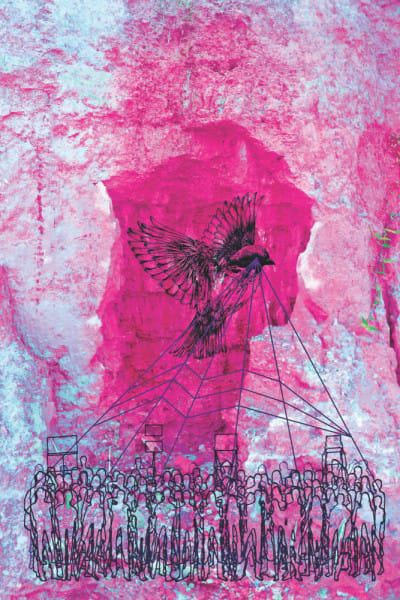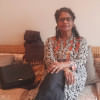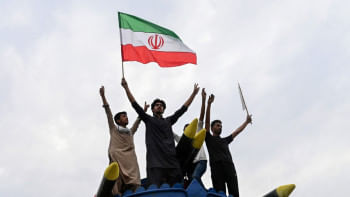A grain of salt

Unbearable sticky sweaty subtropical hotness of August. Disgruntled and disgusted at the shocking turn of events following the popular "Quota" and "Safe Roads" movements. Surrounded by the inescapable urban stink of human and animal waste borne aloft into my rooms by the blazing afternoon sun, seeping offensively into my clothes and through to the pores on my dermis. A slovenly lethargy, an odd sort of unfocused dullness, makes me drag my feet to the kitchen, the northern-most part of my home, away from the verandah on the south with the open drain on the roadside, a deep trench adjacent to the four-feet high boundary wall where residual dung of a tethered sacrificial animal is smoking in the sun's heat.
I feel faint, weakly dizzy amidst the lingering smell of cooked beef and hilsa and sautéed veggies. I steady myself against the kitchen counter and quickly reach for the salt jar. Dipping my right fore-finger into the porcelain globe, I carefully place a grain of iodised salt on the tip of my tongue, and wash it down with a tumbler-full of cool water. My beloved father had impressed upon me the need for this natural remedy to stave off the ill effects of dehydration, and boost the equilibrium of the brain after any prolonged period of mental stress. Now, the rush of saline absorbed by the blood vessels in the tongue tingles up to the nerve ends of the brain's synaptic tissues. I am at once alert, pupils wide, the mind churning up scenes of the radical events of the preceding weeks in Dhaka. Naturally, by association with the picture in the mind, corresponding empathetic felt-emotions of those days spontaneously rise in my heart. Simultaneously.
William Wordsworth, famous for being a man speaking in the language of ordinary men, equally famously iterated the efficacy of 'emotion recollected in tranquillity' for objective analysis and the creative act. My father, a physician of both the human body and the human mind nurtured me with intense care, imparting in simple words and homely stories worldly-wise tips on life as I was growing up, and later delighting in intelligent debate with me as he began to respect my own intellectual ability. His prescription of a 'grain of salt' is one I pass on to all, friend or foe. It is worth ten times the value of 'a spoonful of sugar'. Now, in these times of confusion and 'post-truth', of malicious gossip and engineered smear campaigns, of motivated misdirection and misinformation, of false allegations, hounding and wounding and unjust arrests of liberals, intellectuals, writers, artists, and photojournalists, I have come to venerate 'a grain of salt' as a catalytic agent. That is, metaphorically speaking, a grain of salt has become an apothecary's magic potion to pierce the fabric of hypocrisy and lies. Just as a grain of salt adds zest to the taste of tangy fruit, it aids in transforming one's nebulous half-formed thoughts into rational, concrete ideas and beliefs. Just a grain of salt dissipates gaseous, nauseous proclamations by self-deceiving petty-potentates and clawing, clannish pseudo-tyrants.
The overwhelming euphoria and pride that I felt at the zeal and orderly conduct of the university and school students on the roads of Dhaka city are enmeshed problematically with self-recrimination and guilt at my own cowardice, at my inability to publicly proclaim my support. I was, and still am, wracked with anxious soul-searching: can I morally condone my conduct as a public servant in a democratic country, and as a tertiary-level educator? Is it not hypocritical of me to teach them integrity and ethics and civics in the classroom, give them courage and knowledge and will-to-power, while saving myself from becoming a target of state-sponsored opprobrium and punishment? Will not my loyal students take my counsel too with a grain of salt? Will they not judge me harshly, even though I have provided comfort and positive counsel privately?
I confess that the thin grey fringe around my temple, left untouched with colour during these housebound holidays, shamefully seeks survival and physical safety in these troubled times. I look to other cares, other obligations, other close loyalties as moral justification for my conduct: care and commitment for a sick, fragile octogenarian mother, fidelity to ageing spouse, active support to growing offspring and family living in a city Down Under. All these personal responsibilities are primary duties. Therefore, I choose not to be too bold now, not to be as defiant and outspoken in my sixties as I was in my thirties. These unsettling times of violence against the young and the innocent, of dishonest lawmakers, of cowering constabulary, make me more circumspect, more discreet, than I was in the past. I willingly choose to live longer in the shade of private space. I willingly surrender the limelight of parading in public spaces to those who still have fire in the soul despite the muffling of free speech and restrictions on human rights. I admire these few fiery young leaders. And, a tad cynically, I yield the stage willingly to those among my ambitious colleagues who, though young in years and experience, and somewhat lightweight in intellect, have chosen to grab the opportunity of the moment by wearing the conspicuous colours of separate leading political parties.
It is late afternoon now, and grey clouds loom on the eastern horizon, offering in natural imagery an objective correlative to my own sombre mood. Blue-grey. My city is softly snoozing, convalescing after the tumult and trauma of hundred hours of a new revolution's infancy on the roads, an infant bashed to death by fearful grey-haired politicians, their cohorts and goons. Eid-ul-Adha has taken the human horde — Dhaka's struggling millions— out to distant homesteads. The beastly growl and the chronic chaotic gyrations of this hard metropolis are momentarily quiescent.
Next week, the beast will be woke, the gyrations will resume, and Dhaka will be throbbing with the drumbeat of life's chaotic synergy. I sit in the verandah with the first drops of rain sprinkling the earth. I cannot help but look at the steel horizon, and muse on the fate of the thousands of young students who filled us with so much pride for seven days and nights. What of them in the future? I ask myself. Damaged and betrayed, will they surrender their nationality? Will they choose to leave this land to love from afar, from distant shores where their stupendous courage and leadership will be lauded?
I am afraid. Will the best of the best of my land forever disown me and my generation for having failed them? I ask the easterly breeze as it makes the mango tree sizzle. My heart's cry is reflexively answered by a teardrop on my lower lip. It tastes like a grain of salt.
Rebecca Haque is Professor, Department of English, University of Dhaka.

 For all latest news, follow The Daily Star's Google News channel.
For all latest news, follow The Daily Star's Google News channel. 



Comments